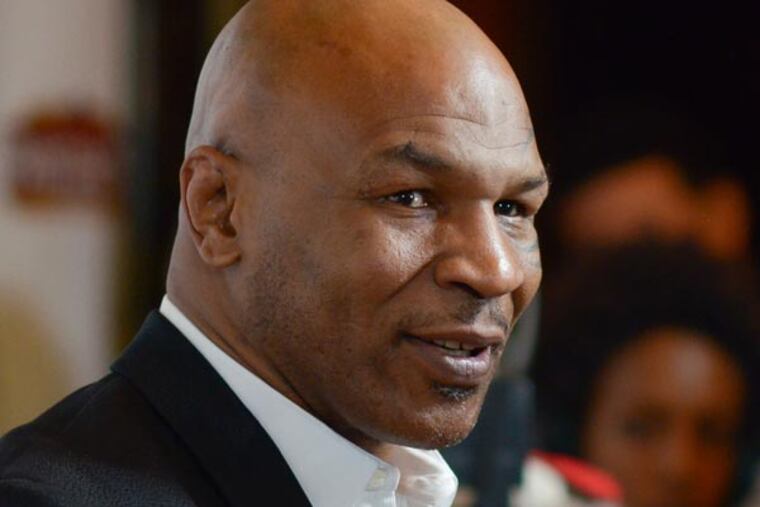Mike Tyson's heavyweight, entertaining self-analysis
In the ring, Mike Tyson obliterated opponents in the blink of an eye. The thunder-and-lightning pugilist once set a Junior Olympic record by knocking out an opponent in 8 seconds, and at 20 he was the youngest heavyweight champion in history.

In the ring, Mike Tyson obliterated opponents in the blink of an eye. The thunder-and-lightning pugilist once set a Junior Olympic record by knocking out an opponent in 8 seconds, and at 20 he was the youngest heavyweight champion in history.
On stage at the Academy of Music on Thursday night, the 46-year-old Tyson had a daunting task before him that required more endurance than power and speed. In his one-man show, "Mike Tyson: Undisputed Truth," the ex-champ was charged with entertaining an opera house crowd full of fight fans for nearly two hours, with only his life story to propel him.
So how'd he do? Much better than you might think.
At the start of the Spike Lee-directed show, Tyson came on stage to intro music from Jay-Z and, more surprisingly, Nat King Cole. The latter, in "Nature Boy," sang of "a very strange, enchanted boy" who takes a hard road to the life lesson that "the greatest thing you'll ever learn / Is just to love and be loved in return."
Dressed in black pants and jacket and a white T-shirt, Tyson, near his fighting weight of 220 pounds, faced the room with his Maori warrior tattoo on his face and a trademark lisp that didn't keep him from clearly enunciating the word epiphany. He took occasional between-round breaks, usually after addressing a devastating loss - the death of his mother, or of his mentor, Cus D'Amato, or of his sister Denise.
He was foul-mouthed, for sure, frequently apologizing to a youngster in front for using four- and 12-letter words (and often repeating them in the apology). But he was also very funny, promising early on, for instance, that everyone would leave with both of their ears, a reference to his 1997 carnivorous clash with Evander Holyfield.
Aided only by a low-tech series of slides, Tyson was magnanimous toward Holyfield, ever thankful to D'Amato - who told him, "If you don't face your demons, they'll haunt you till the day you die." And Tyson was gracious toward Michael Spinks, the ex-champ whose career he ended in 1988. Spinks was in attendance.
Tyson directed his venom most amusingly at Mitch "Blood" Green, the fighter he knocked out once in the ring in 1986 and once while shopping for clothes in Harlem two years later. No kind words were spoken of former manager Don King, who he said used to charge him $8,000 a week for towels, or first wife Robin Givens, in whose honor Tyson danced with impressive agility to Kanye West's "Gold Digger."
Tyson told a side-splitting story about going to Givens' house after the duo were separated for a booty call, only to see her drive up with Brad Pitt. At the time, he said, he found the young actor so pretty that "I didn't know whether to fight him or . . . " - well, you get the idea.
He insisted he was not guilty of raping beauty queen Desiree Washington, and blamed that 1992 conviction on King for hiring a tax lawyer to defend him.
"I didn't need a tax lawyer then - I need one now," he said, owning up to being broke despite earning more than $300 million in purses.
Throughout the show, which dragged at times, Tyson was hardest on himself. Rather than dwell on triumphs, he examined his failures. He told of being locked up 38 times by the time he was 12 years old. The only fight footage shown was when he suffered his first knockout, at the hands of Buster Douglas in 1990. He sends his children to great schools "so they can humiliate me," he said. "Daddy, they say, 'You know that's not how you spell Christmas, don't you?' "
That kind of self-laceration turns Tyson into an empathetic figure on stage. As he talks about the "low self-esteem and big, megalomaniacal ego" that have repeatedly done him in, he seems open and honest rather than manipulative. "I hope you leave with a better understanding of my life," he said in closing. Whether the audience leaves with that knowledge or not, "Undisputed Truth" makes it clear that Tyson has gained it for himself.